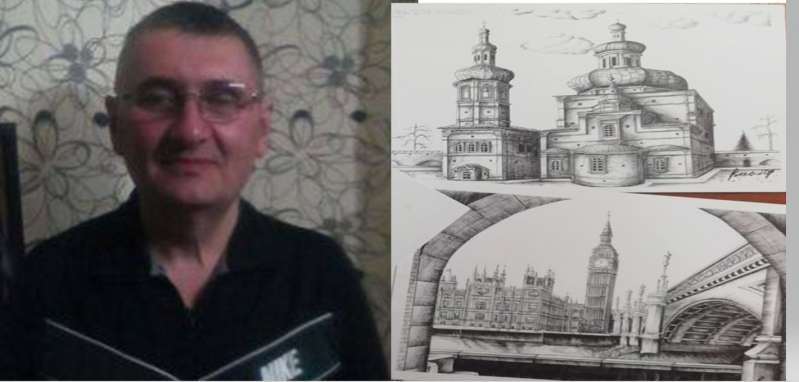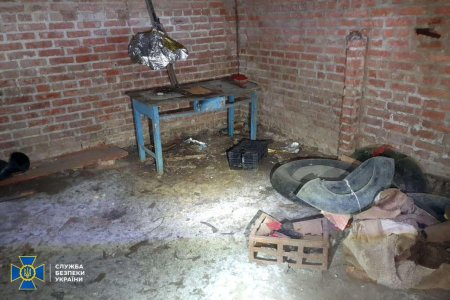
Russia’s enforced disappearances, abductions, torture and politically motivated ‘trials’ have escalated since its full-scale invasion of Ukraine, but they all began back in 2014. It is now ten years since the Russian FSB abducted Viktor Shur, with the 57-year-old from Chernihiv vanishing for some time before Russia admitted to holding him and came up with ‘spying’ charges. Shur will be turning 68 on 10 March 2025 and, if nothing changes, will be 70 when released after a 12-year sentence probably imposed over a photo of cows grazing on the territory of a disused aerodrome.
Shur was born in Chernihiv on 10 March 1957. The son of a well-known Chernihiv art-collector, he too became both an art-collector and a jeweller. It was for convenience because of this work that, after the collapse of the USSR in 1991, he opted for permanent residence status in his native Ukraine, while taking a Russian passport. Although now a Ukrainian citizen, the FSB used his Russian citizenship as an excuse for accusing him of ‘state treason’. It was a cynical pretext since, as the then Memorial Human Rights Centre noted in declaring Shur a political prisoner, his persecution clearly needed to be viewed “against the background of an unending anti-Ukrainian campaign dating from the end of 2013 in both the state media and in the pronouncements of officials holding high-ranking posts in the Russian Federation.” One of the components of this anti-Ukrainian campaign involved the criminal prosecution of Ukrainian citizens and people expressing views that diverged from those pushed by Moscow.
Russia has admitted to holding Shur in detention from 9 December 2014, although he, in fact, disappeared on around 7 December. Shur had received a phone call from a client and arranged to drive to the Bryansk oblast. He had expected to return immediately, so when he simply vanished, his family began searching. It was, however, only after a week that Shur phoned and said that he had been arrested, supposedly, for fighting with a policeman and that he would return in another week. The family were then told that he had been arrested for violating the rules for a state-guarded site, with that subsequently stepped up to a charge under Article 275 of Russia’s criminal code with state treason and collaboration with the security services of a foreign state.
Much later, his family learned that he had been seized in the zone between the Ukrainian and Russian borders by men in masks who smashed the car windows and used smoke bombs against him.
All of these ‘trials’ under Article 275 or 276 (spying) are shrouded in secrecy, and here Shur was deprived of any independent legal assistance. Memorial has seen the sentence which, apparently, asserts that on 9 December 2014, Shur received instructions from Ukraine’s Border Service to photograph ‘a military site’ in Russia and was given a camera to do this. It was claimed that on that same day (at least two days after the real date), Shur had crossed the border, travelled to military unit No. 4110-3 and had “gathered information constituting a state secret”, with this treated as ‘treason in the form of spying’. He had, purportedly, been detained on 9 December.
The FSB appear to have accused Shur of having photographed a field on which cows were grazing. The FSB claimed that this was a site of strategic importance, containing flooded mines and a former military aerodrome. The local residents who let their cows graze there were clearly unaware that this was ‘a military site’ (and had not been used as such since the 1960s), and there was absolutely no reason for Shur to have known this.
Shur’s daughter Olha has said that during her brief visits, a guard was present throughout. Her father would have known that he would be stopped, and would later face reprisals, if he spoke about the treatment he received. He was able to tell his son (who is no longer alive) that the so-called investigators used psychotropic drugs to get information (or more likely ‘confessions’) out of him and that torture had been applied (though he gave no details).
Olha has told Memorial that her father was heavily pressured by the ‘investigator’ to reject the independent lawyer they found for him and was prevented from seeing the Ukrainian consul. He agreed to admit to the charges under torture, and because he was promised a 2-3-year sentence if he did so.
He was bitterly deceived. On 7 October 2015, ‘judges’ Y.P. Bykov (presiding); M.A. Andrusenko and N. V. Tretyakova from the Bryansk regional court found him ‘guilty’ and sentenced him to 12 years’ maximum-security imprisonment. The entire proceedings were behind closed doors, with Memorial noting that this too, especially given the lack of an independent lawyer, violated his right to a fair trial.
Viktor Shur has spent a decade in the appalling conditions of a Russian penal institution. He was prevented from bidding a final farewell to his father, and to his son, with his only lifelines being contact with his daughter, the letters he receives and his artwork, some of which was exhibited two years ago in Berlin.
Russia’s brutality against the 67-year-old cannot be overstated. A year ago, he needed to be hospitalized due to a severe haemorrhage and he suffers from bronchitis and a bone-related condition. He has also complained of deteriorating eyesight, with this especially serious given the obvious importance to him of his artwork.
Please write to Viktor Shur!
As well as showing him that he is not forgotten, letters and cards also send an important message to Moscow and the penal service that their treatment of him is under scrutiny. The messages need to be hand-written, and, unfortunately, only in Russian.
Address
241021 Russian Federation, Bryansk, 30 Komarova St., Prison Colony No. 1,
Shur Viktor Valentinovich (born 1957),



